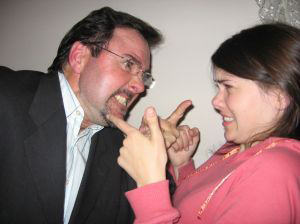Since 1993
Your Right to Confront Your Accuser in a Florida Criminal Trial

By: John Guidry II
There’s lots of talk these days about “rights”. Some would even say that you must fight…for your right, to party (how many legal publications quote the Beastie Boys? Only one that I know of…). But if you’re unlucky enough to be accused of a crime, at least you are cloaked with many protective rights. Today, we’ll be discussing an important right–the right to confront your accuser. Sounds easy enough, right? Whoever accuses a citizen of a crime, that defendant has a right to confront that person or evidence. The problem becomes that many accusers/victims attempt to skirt this requirement by making references to other accusers who are not available. Such references often, mistakenly, lead a jury to believe that there is more evidence against a defendant than the defendant has an opportunity to confront. Got that? Yes, this is tough issue to sort out, but don’t worry, recently a Florida appeals court addressed just such an issue.
Facing a Criminal Trial in Orlando? Protecting your constitutional rights is everything. An experienced trial attorney knows how to spot and challenge illegal testimony that can unfairly prejudice a jury. Call John Guidry: (407) 423-1117
In State v. Ferrey, 35 So.3d 177 (Fla. 3rd DCA 2010), state witnesses made repeated references in trial to the victim’s neighbor, who was stricken from the witness list before trial and was not called to testify. The appellate court found that the multiple references to a neighbor’s testimony warranted a new trial on charges of burglary of a dwelling with assault or battery and attempted sexual battery. Basically, the references implied that someone other than victim had identified defendant as the perpetrator, giving rise to an inference that neighbor had identified defendant, in violation of Ferrey’s right to confront the witnesses against him. Let’s see how it played out.
Ferrey was charged with burglary of a dwelling with assault or battery, and attempted sexual battery. At trial, the victim testified that she was awakened from her sleep by a man grabbing her by the throat and attempting to sexually assault her. She screamed, causing the suspect to run from the house. In response to the question of whether or not she saw her attacker in the courtroom she pointed hesitantly at Ferrey, and testified that she could not make out the details because the room was dark, further noting that Ferrey looked a little different there in court. She then claimed she was “almost sure” he was the assailant, then making references to her neighbor Carlos.
But now, the confrontation problems begin to mount. The lead detective next testified that he obtained information from the victim’s neighbor, Carlos. The trial court sustained several objections from the defense for mentioning Carlos, the absent witness, and the hearsay containing Carlos’s statements inferring that Carlos actually had observed the suspect. The trial court instructed the prosecutor “not to mention Carlos or elicit any testimony referring to Carlos and warned that she would grant a mistrial if the State continued to suggest that there was additional evidence of guilt that the jury would not hear”. Id.
During jury deliberations, the jury asked the court whether they could use the references to Carlos made during trial, and the trial court properly answered “that the statement had been stricken and they could not use it in their deliberations.” Ferrey was found guilty by the jury on all counts.
The appellate court began their analysis with a look at Postell v. State, 398 So.2d 851 (Fla. 3d DCA 1981). “In Postell, the prosecutor elicited, through the testimony of a police officer, the out-of-court declarations of an unidentified eyewitness to the armed robbery with which Postell was charged. In that case, the Third District held that, “where, as in the present case, the inescapable inference from the testimony is that a non-testifying witness has furnished the police with evidence of the defendant’s guilt, the testimony is hearsay, and the defendant’s right of confrontation is defeated, notwithstanding that the actual statements made by the non-testifying witness are not repeated.” Id. at 854.” Id.
Ferrey’s convictions were overturned, based upon the above analysis in Postell, finding that “the logical inference that followed this challenged inadmissible hearsay was that Carlos, a non-testifying witness, gave the detective accusatory information which ultimately led to Ferrey’s photo being placed in the lineup, and his subsequent arrest. This violated Ferrey’s right to confront witnesses against him and prejudiced his right to a fair trial. We find that the error was pervasive, not harmless in light of the jury’s questions about this evidence, and the trial court did not abuse its discretion by granting the motion for new trial.” Id.
John’s Key Takeaways: The Right to Confront Your Accuser
- Your Constitutional Right: In any Florida criminal trial, the Sixth Amendment gives you the absolute right to confront and cross-examine the witnesses testifying against you.
- The “Ghost Witness” Problem: Prosecutors may try to get around this right by having a witness on the stand (like a police officer) refer to what a non-testifying “ghost witness” (like a neighbor) supposedly saw.
- Inadmissible Hearsay: This tactic is illegal because it creates an “inescapable inference” of guilt from someone your attorney cannot question. This is a form of inadmissible hearsay and a violation of your rights.
- A Path to Overturning a Conviction: As shown in the real-life Florida case of State v. Ferrey, a conviction obtained using this tactic can be overturned on appeal because it violates a defendant’s right to a fair trial.
- Why an Experienced Attorney Matters: Recognizing and challenging these complex constitutional violations in the heat of a trial is a critical skill. A defense attorney with decades of courtroom experience can protect your rights and ensure the State is forced to prove its case fairly.

About the Author, John Guidry II
John Guidry II is a seasoned criminal defense attorney and founder of the Law Firm of John P. Guidry II, P.A., located in downtown Orlando next to the Orange County Courthouse, where he has practiced for over 30 years. With more than three decades of experience defending clients throughout Central Florida since 1993, Guidry has successfully defended thousands of cases in Orange, Seminole, Osceola, Brevard, Lake, and Volusia counties. He has built a reputation for his strategic approach to criminal defense, focusing on pretrial motions and case dismissals rather than jury trials.
Guidry earned both his Juris Doctorate and Master of Business Administration from St. Louis University in 1993. He is a member of the Florida Bar and the Florida Association of Criminal Defense Lawyers. His practice encompasses the full spectrum of Florida state criminal charges, with a particular emphasis on achieving favorable outcomes through thorough pretrial preparation and motion practice.
Beyond the courtroom, Guidry is a prolific legal educator who has authored over 400 articles on criminal defense topics. He shares his legal expertise through his popular YouTube channel, Instagram, and TikTok accounts, where he has built a substantial following of people eager to learn about the law. His educational content breaks down complex legal concepts into accessible information for the general public.
When not practicing law, Guidry enjoys tennis and pickleball, and loves to travel. Drawing from his background as a former recording studio owner and music video producer in the Orlando area, he brings a creative perspective to his legal practice and continues to apply his passion for video production to his educational content.








